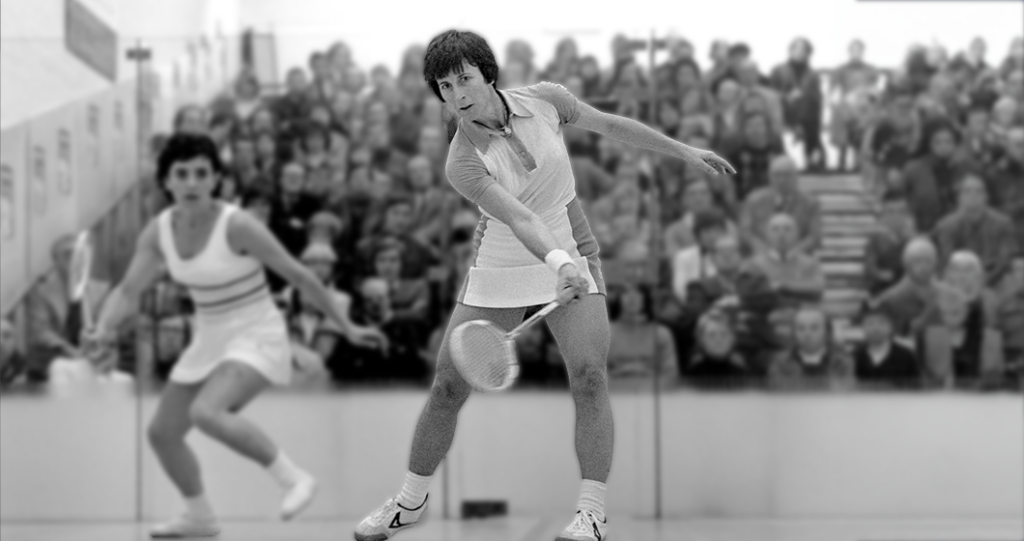Featured News
PSA50: Heather McKay – An Incredible Career
Ask any club player who the most dominant player in squash history was and many will instantly think of Jahangir Khan’s 555 match unbeaten streak in the men’s professional game during the 1980s – a run that has taken on an almost mythical status in the squash world. Others will look to Ramy Ashour’s unbeaten 2012 season or Nicol David’s incredible 11 year stretch as World No.1 – the defacto benchmark for any current or future professional to aspire to.
While all three are indeed incredible feats, there is one player whose on court record eclipses all three of those marks – yet her exploits in the game remain frustratingly unknown to many of the squash playing public – that player is Heather McKay (nee Blundell).
Over the course of an incredible 19-year spell between 1962 and when she retired in 1981 (two years before the first official women’s world rankings were created) McKay was simply unbeatable. Such was her dominance that, after losing the Scottish Open final in 1962, she affirmed that no one would ever beat her again. No one ever did.

She won a staggering 16 consecutive British Open titles, from 1962-1977, losing only two games at the championship during that entire time. In the 1968 championship final, she won the final against her compatriot Bev Johnson without dropping a single point.
The Australian, born 1941, is one of the greatest athletes in sporting history – indeed her prowess as an athlete extended beyond the squash court, with McKay representing Australia at hockey in 1967 and 1971, and after taking a short break from the squash circuits in 1977, she won the American Amateur Racquetball Championship, American Professional Racquetball Championship and the Canadian Racquetball Championship – earning an induction into that sports’ Hall of Fame.
She returned to squash for the first official Women’s World Championship at Sheffield in 1979. Though then 38 years old and ring-rusty, she still prevailed, dropping only one game to England’s Sue Cogswell in the final.
This domination however had been achieved almost accidentally.
At 17, Heather Blundell was already an ardent sportswoman, playing competitive tennis and hockey. It was only whilst on holiday in Sydney that McKay stumbled upon a squash court for the first time – where she was impressed by the athleticism on show, which led her to take up a racket for the first time in an effort to aid her hockey-focused fitness training.

McKay continued to play squash, becoming more and more enthralled with the game’s speed and competitiveness. A foray into competition at the New South Wales local county Championships resulted in McKay clinching both the Junior and Women’s titles. Then President of the Australian Squash Racquets Association, Vin Napier, suggested that she participate in the New South Wales State Championships in Sydney – aged just 18. She reached the quarter-finals of the senior event and won the junior championships.
One year later, aged 19, she won the Australian Amateur Championships – which she would win fourteen straight years (1960- 1973).
What makes McKay’s success even more impressive is, that while her male counterparts of the era such as Jonah Barrington and Geoff Hunt were earning a living from the game as the first professionals, McKay maintained a regular job as a receptionist at the Bellevue Hill Squash Centre – as it would be another decade before the women’s tour followed suit and went professional.
But just like Barrington and Hunt, both of whom garnered reputations based on their physical prowess and ability to outlast opponents, McKay too focused on supreme fitness in her pursuit of victory.
Only five feet six inches tall and little more than nine stone, she was nevertheless very physical – able to hit harder than most opponents and to move faster than any of them. She turned and changed direction with devastating speed. She was also very strong-minded, making her focused, ruthless, and consistent. It made her conspicuously self-possessed too, creating a formidable on-court presence.
After retiring from the circuit in 1981 and setting the foundation upon which the women’s professional tour could be built – McKay continued on in competitive squash at international Masters level winning four World Championships in 1987 (45), 1990 (45), 1993 (50) and 1995 (50), leaving behind a legacy and record that will never be surpassed.








